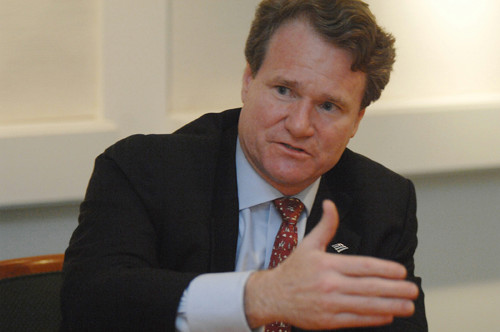
Brian Moynihan, the highest-ranking executive at America’s biggest bank, returned to familiar turf last week when he attended the Greater Providence Chamber of Commerce’s annual meeting. Moynihan, 50, graduated from Brown University in 1981, worked for nine years at the law firm Edwards Angell Palmer & Dodge LLP, then left to join FleetBoston as deputy general counsel. These days, the Bank of America CEO is shepherding the $2.3 trillion company through a mortgage foreclosure crisis and an economy that’s still sputtering. He sat down with Providence Business News last week to talk about the bank, the economy and Rhode Island.
PBN: How often do you visit Rhode Island? And do you stay connected with what’s going on here?
MOYNIHAN: Probably every month. I came when I was 17 years old. I’ve been here on and off from 1977 to 1996, then I moved to Boston when we moved the headquarters of Fleet [Bank] up there. I’ve been here most of my life. I know this place better than most people do. … Two of my kids were born here. It’s one of the all-time great cities in the world to bring a family in, live in.
PBN: Many who live and work here say the state’s business climate is poor, that we’re not business-friendly. Do you agree with that assessment?
MOYNIHAN: We employ a lot of people here, and have for years. Frankly, one of the things that Gov. [Donald L.] Carcieri did very well at the time was when they first did the transaction with FleetBoston, he said, “Tell us what you need to do, and we’ll see if we can help you out.” I think that benefited the state from the employment level we have. …[Rhode Island] is more business-friendly than some of the communities we do business with around the country and around the world.
PBN: So the hand-wringing about Rhode Island’s low ranking in categories such as taxes is overblown?
MOYNIHAN: I think the need to build a structurally good place for [businesses] to employ people and for industry to grow is critical for all places. Rhode Island has the obvious issue in that it’s smaller, but per square inch has more stuff than most places. The universities here, the hospital system here. I’ve seen Brown’s impact here. … This state has always had high talent, high quality of life. … I don’t think I’d be handwringing if I were here.
PBN: How will Bank of America’s corporate presence in Rhode Island change in the future?
MOYNIHAN: Our employee base around the world is relatively stable. Our employee base in Rhode Island will be what it is today, the same kinds of functions. We’re not moving things around. We have Merrill Lynch teammates, U.S. Trust teammates, commercial lenders, the 40 branches we have and the call [centers]. I don’t see that changing. Now does that mean we might hire a few more people? Yes, but we’re not moving operations around.
PBN: Do you feel that winding out of the mortgage mess that existed, is it distracting the economy and Bank of America from growing jobs?
MOYNIHAN: I don’t think it’s distracting the economy. The construction industry is down – that is affecting the economy. Jobs in that area are hard to come by. Housing starts aren’t as high because we built too many homes, and it’s going to take a while to absorb the inventory. The second thing is when consumers borrowed, they took money out of their house and spent it. That’s not going on today. … Now the issue is, consumers were spending so much and driving so much consumption, but that’s pulled back. … So I see the mortgage issues are more the outcome of the economic struggles as opposed to an input at this point. And it is very tough sledding.
PBN: A lot of local small businesses complain that they can’t get credit, yet when I speak to bankers, they say that loan demand is sagging right now. Where does the truth lie?
MOYNIHAN: They’re both true statements. Last year, for 2010, we said we’d do $5 billion more in credit to small and medium businesses under $50 million in revenue than we did last year. We’ve already done $12 billion more. Our approval rates for credit [of approximately] $300,000, $400,000, $500,000 are as high as they’ve ever been. The difficulty is when you get a startup business or a business in certain industries, it’s real tough to give credit. Real estate development, retail, restaurants, starting a new construction company – it’s tough to give credit because there’s not enough demand for the product. … They really need equity.
But small businesses don’t rank credit as a big issue. Uncertainty about taxes, about health care, about their business prospects – that’s what they rank.
PBN: Bank of America has said there were 25,000 mortgage modifications in October, which is about 50 percent higher than the previous month. Why that jump?
MOYNIHAN: If you look at our [federal Home Affordable Modification Program] from last November to this November, I think literally we only had about 100. You had to build people up to do this. We’ve been building those up because we have more people [working on them]. This quarter we’ll hire 1,500 more people to handle modifications and helping people in times of stress. We’ve been building that over the last 24 months from 10,000 [employees] to 20,000 to 25,000. … We got heavily criticized earlier this year about how many modifications we’re doing. But our view was do it right and do it slow.
PBN: Should we be modifying these loans, or should they be allowed to go into foreclosure?
MOYNIHAN: I think we owe it to people to try. If there are 10 people and you’re able to modify five or them, that’s better than all 10 people going through [foreclosure]. … But we have to be careful that once we’ve tried, then you have to let the process take its course.
PBN: How much of the mortgage trouble is tied to Countrywide?
MOYNIHAN: We bought the biggest mortgage servicer in the country after the housing crisis had started. So statistically, they are the dominant part of all this. It’s our job to clean that up. It takes a lot of work, and sometimes more work than anybody predicted. On the other hand, it’s the right thing to do for America to clean it up. As we talk to people, we want to make sure that we all understand that we are cleaning up something that absent our acquisition of this thing would have been a bigger mess for America.
PBN: I know you weren’t CEO when the Countrywide acquisition took place, but is there a certain amount of regret about that purchase?
MOYNIHAN: We’re doing more mortgages on the front-end than anyone else. We’re doing them better than anybody else. You can always look back. My job is to take what we did and clean it up and look forward. And that’s what we’re doing. •












Is Moynihan for real in telling us that Governor Carcieri did well in providing project status when BOA purchased a building in East Providence for its call center? This resulted in lost tax revenue for RI in that BOA paid no taxes on the materials associated with the transaction predicated on job creation. Last month, BOA terminated a number of RI employees. They should give the lost tax revenue back. This is another example of economic development on steroids.